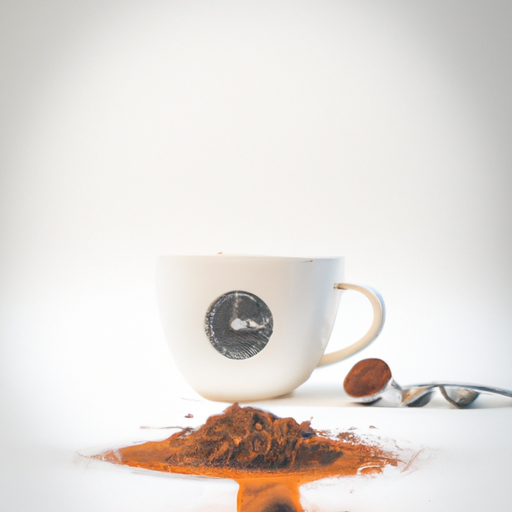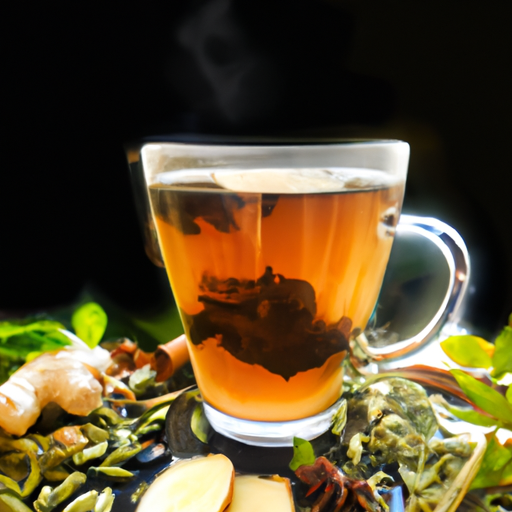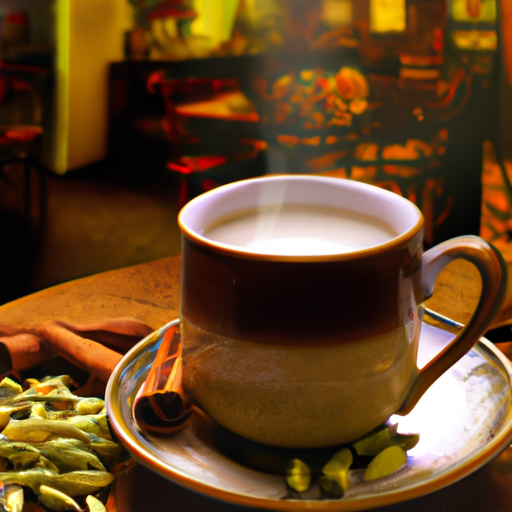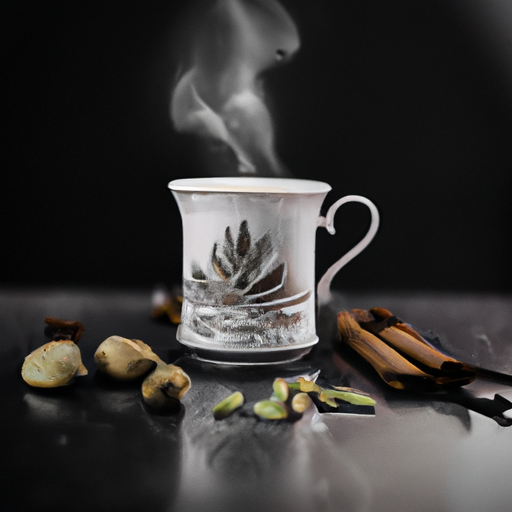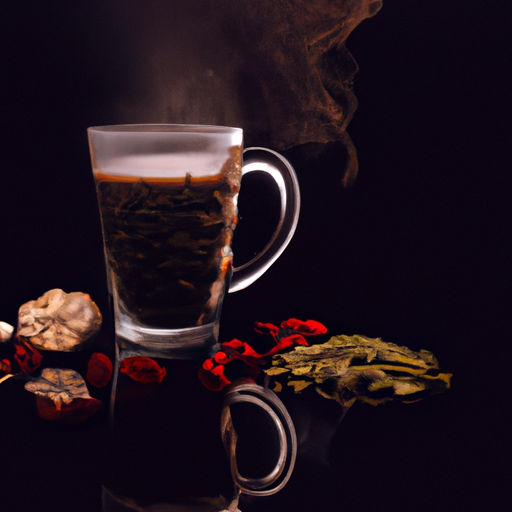Were you aware that chai tea ranks as a global favorite beverage? Indeed, it’s estimated that more than 1 billion cups of chai are enjoyed daily!
As someone who loves a good cup of chai, I understand how important it is to get the right balance of flavors and ingredients. One common question people have when making their own chai at home is: how much tea should I use per cup?
In this article, we’ll explore everything you need to know about brewing the perfect cup of chai tea. From understanding the factors that affect the amount of tea needed to adjusting your recipe for your taste preferences, we’ll cover it all.
So whether you’re a seasoned chai drinker or new to this delicious beverage, read on to discover how much chai tea per cup is just right for you.
Key Takeaways
- The amount of chai tea per cup needed varies depending on factors such as brewing technique, water temperature, and steeping time.
- Investing in high-quality loose-leaf black tea and spices is essential for brewing traditional Indian chai.
- Adjusting the amount of tea and spices can help control the flavor profile of chai tea.
- Milk is an essential component of chai tea, and there are numerous options available for variations in flavor.
What is Chai Tea? A Brief Overview
If you’re not familiar with it, chai tea is a delicious and aromatic blend of black tea, spices, and milk that originated in India. Chai means ‘tea’ in Hindi, and the drink has been consumed for centuries throughout South Asia. The traditional recipe includes a variety of warming spices such as cinnamon, cardamom, ginger, cloves, and black pepper.
Aside from its rich history and cultural significance, chai tea also offers numerous health benefits. Black tea contains antioxidants that may help reduce the risk of chronic diseases such as heart disease and cancer. Additionally, many of the spices used in chai have anti-inflammatory properties which can aid digestion and boost immune function.
When it comes to making a perfect cup of chai tea at home, there are several factors that affect the amount of tea needed. These include the strength of your preferred brew (some like it strong while others prefer a milder taste), the size of your cup or mug, and whether or not you plan to add additional ingredients such as honey or sugar.
Factors that Affect the Amount of Tea Needed
The amount of tea required varies depending on different factors, such as steeping time and water temperature. Brewing techniques also play a significant role in how much chai tea per cup is needed. For instance, if you are using a French press or teapot to brew your chai tea, you may need more tea leaves than when using an infuser basket.
Moreover, the quality of the tea used affects how much chai tea per cup should be added. The better the quality of the tea used, the less quantity you would need to make a flavorful and satisfying cup of chai. Therefore, it’s essential to invest in high-quality loose-leaf black tea and spices like cardamom pods, cinnamon sticks, ginger root, cloves, and black pepper for brewing traditional Indian chai.
Several factors affect how much chai tea per cup. Steeping time and water temperature play a crucial role in determining the right amount of leaves to use while brewing techniques can influence this as well. Additionally, using high-quality loose-leaf black teas and spices can result in smaller quantities being needed for a delicious cup of authentic Indian masala chai. Next up is learning about how to prepare a traditional chai recipe that perfectly balances all these factors for an aromatic infusion that pleases your taste buds!
Traditional Chai Tea Recipe
Get ready to indulge in the rich and aromatic flavors of a traditional Indian masala chai with this easy-to-follow recipe that will transport you to the streets of Mumbai.
To make the perfect cup of chai tea, start by gathering your ingredients. You’ll need black tea leaves, whole spices such as cinnamon, cardamom, cloves, ginger root, and black peppercorns.
In a saucepan over medium heat, combine two cups of water with one tablespoon each of black tea leaves and chai tea spices. Bring it to a boil and let it simmer for five minutes.
Add two cups of milk and bring the mixture back to a boil before lowering the heat to allow it to simmer for another five minutes. Strain the mixture into mugs or teacups using a fine-mesh strainer.
To adjust the amount of tea for your taste, simply add more or less black tea leaves depending on how strong you want your brew. Adjusting the amount of spices can also help control its flavor profile; if you prefer more cinnamon or ginger notes, then feel free to add more in during brewing.
The key is finding what works best for your palate so that every sip is as enjoyable as possible!
How to Adjust the Amount of Tea for Your Taste
Now, imagine yourself as a painter with a blank canvas, ready to create the perfect cup of chai that suits your taste buds. Experiment with different amounts of black tea leaves until you find the right balance, just like mixing colors on a palette until you achieve your desired hue.
Here are some tips to help you adjust the amount of tea for your taste:
-
Start with 1 teaspoon of black tea leaves per cup and increase or decrease the amount based on your preference.
-
If you prefer a stronger flavor, add more tea leaves instead of steeping for a longer period. This’ll prevent bitterness from over-steeping.
-
Experiment with different spices such as cinnamon and cardamom to enhance the flavor profile without adding more tea leaves.
-
Try adjusting steeping time by starting at 3 minutes and increasing by 30 seconds each time until you find your preferred strength.
-
Keep in mind that other factors such as water temperature and milk/sugar content can also affect the overall taste.
By adjusting these factors, you can create a customized cup of chai that’s perfectly suited to your individual palate. In addition to experimenting with amounts of ingredients, there’re other tips for making the perfect cup of chai tea.
Tips for Making the Perfect Cup of Chai Tea
To brew the perfect cup of chai, start by selecting high-quality ingredients and measuring them according to your taste preferences. When it comes to steeping time, aim for 5-7 minutes for a strong flavor. However, keep in mind that over-steeping can result in a bitter taste.
Milk is an essential component of chai tea, and there are numerous options available based on your preference. Full-fat milk provides a creamier texture and richer taste, while non-dairy alternatives such as almond or soy milk offer a lighter option. Additionally, you can adjust the ratio of milk to water according to your liking.
Spices are what make chai tea so unique and flavorful. Common spices used include cinnamon, cardamom, ginger, cloves, and black pepper. Experiment with different combinations until you find your preferred blend. Sweeteners such as honey or sugar can also be added to balance out the spiciness.
When it comes to chai tea variations, there are endless possibilities depending on personal preference and cultural influences. Some popular variations include masala chai (spiced tea), Kashmiri chai (pink tea), or Thai iced tea (with condensed milk). The key’s to experiment with different ingredients until you find the perfect combination that suits your taste buds best!
Chai Tea Variations
When it comes to chai tea, there are so many variations to explore. Personally, I love a good masala chai with its blend of aromatic spices like cinnamon, cardamom, and ginger.
For those hot summer days, an iced chai tea can be refreshing and satisfying.
And when I’m in the mood for something creamy and indulgent, a chai tea latte hits the spot with its frothy milk and sweetened spice blend.
Let’s dive into the world of chai tea variations!
Masala Chai
You’ll want to use about one teaspoon of loose leaf masala chai per cup for a bold and flavorful brew. Masala chai is a traditional Indian blend of black tea, aromatic spices, and milk. The spice blend typically includes cinnamon, cardamom, cloves, ginger, and black pepper. These ingredients come together to create a warming and fragrant tea that is perfect for chilly mornings or relaxing evenings.
To make the perfect cup of masala chai, it’s important to use fresh spices and high-quality loose leaf tea. You can experiment with different brewing techniques to find your preferred balance of flavor and strength. Some people like to simmer their masala chai on the stovetop with water and milk for an extra creamy texture. Others prefer to steep their loose leaf tea in hot water before adding milk and sweetener. However you choose to brew your masala chai, be sure not to overdo it with the spices – too much can overpower the delicate flavors of the tea itself.
As we move into discussing iced chai tea, there are a few adjustments you’ll need to make in order to achieve the perfect balance of sweetness and spice in a chilled beverage.
Iced Chai Tea
If you’re in the mood for a refreshing and flavorful beverage on a hot day, why not try an iced chai? Iced chai is made by brewing tea with spices (such as cinnamon, cardamom, and ginger), adding milk or cream, and serving over ice.
There are many variations of iced chai that you can make at home – some people prefer it sweeter while others prefer it spicier. To make the best iced chai recipe, start by brewing your favorite black tea with spices. You can use loose leaf tea or tea bags – just make sure to add the spices (or use a pre-made chai blend) to the water while brewing.
Once the tea is brewed, strain out any solids and let cool. Next, mix in your desired amount of sweetener (such as honey or sugar) and chilled milk or cream. Pour over ice and enjoy!
As much as I love iced chai, sometimes I’m in the mood for something with a little more kick – like a chai tea latte.
Chai Tea Latte
Indulge in a creamy and spiced drink by trying out a delicious chai tea latte. This beverage combines the bold flavors of black tea with aromatic spices, such as cinnamon, cardamom, ginger, and cloves. The addition of steamed milk gives it a creamy texture that balances out the strong spices.
If you’re looking to switch up your usual coffee order or simply want to try something new, here are three reasons why you should give chai tea lattes a try:
-
They can be customized to your taste preferences. Whether you prefer it sweeter or spicier, you can ask for extra syrup or additional spices.
-
Chai tea lattes are lower in caffeine compared to coffee drinks like lattes or cappuccinos. This makes them a great option if you’re looking for a warm beverage without the jitters.
-
The spices used in chai tea have been linked to potential health benefits like reducing inflammation and aiding digestion.
As much as we love indulging in our favorite drinks, it’s important to also consider their potential health benefits. That’s why the next section will explore how drinking chai tea can positively impact your well-being.
Health Benefits of Chai Tea
Hey, did you know that drinking a cup of chai tea daily can boost your immune system and reduce inflammation thanks to the antioxidants present in its ingredients? Not only does it taste delicious, but chai tea also offers numerous health benefits. For example, some studies suggest that consuming chai tea regularly can improve digestion and promote mental clarity.
Let’s take a closer look at the specific health benefits of chai tea. The table below outlines some of the key ingredients in traditional chai tea and their potential health benefits:
| Ingredients | Health Benefits |
|---|---|
| Black Tea | Boosts Heart Health & Improves Alertness |
| Cinnamon | Anti-Inflammatory & May Improve Blood Sugar Control |
| Ginger | Relieves Nausea & Pain Relief for Arthritis |
| Cardamom | Detoxifies & Promotes Healthy Digestion |
As you can see, each ingredient in chai tea has unique properties that contribute to overall health and wellness. By combining them all into one delicious beverage, you get an easy way to add these beneficial elements into your diet.
Overall, incorporating a cup of chai tea into your daily routine could have significant positive impacts on your mind and body. From improved digestion to better mental clarity, this tasty drink is worth giving a try. Plus, learning about the culture and history behind this beloved beverage makes it all the more enjoyable!
Chai Tea Culture and History
Chai tea has a rich cultural history that dates back centuries, with its origins deeply rooted in India and surrounding regions. As a staple beverage in Indian households, chai has become synonymous with hospitality and warmth. It is often served to guests as a symbol of welcome and respect.
Brewing techniques for chai tea vary from region to region but generally involve steeping black tea leaves in hot water along with spices such as cardamom, cinnamon, ginger, and cloves. The mixture is then combined with milk and sugar to create a creamy and flavorful beverage. Many popular brands have emerged over the years, offering different variations of the classic recipe.
Tea rituals play an important role in many cultures around the world, including those where chai tea is prevalent. In India, for example, it is customary to offer chai during important ceremonies such as weddings or religious festivals. Chai tourism has also become increasingly popular in recent years, with travelers seeking out authentic experiences at local tea houses or markets. Tea accessories such as clay cups or strainers are often used to enhance the drinking experience.
When it comes to buying chai tea, there are many options available both online and in stores. Whether you prefer loose leaf or bagged versions of this beloved beverage, there are plenty of reputable brands to choose from that offer high-quality products at reasonable prices.
Where to Buy Chai Tea
If you’re a fan of this comforting beverage, you’ll be happy to know that there are over 100 different brands of chai available for purchase online or in stores. However, not all brands are created equal.
Some of the best brands of chai tea include Twinings, Tazo, and Bigelow. These companies offer a variety of flavors and styles, including loose leaf and tea bags.
When it comes to selecting the best type of chai tea for your taste buds, it’s important to consider whether you prefer loose leaf or tea bags. Loose leaf chai offers a more robust flavor because the leaves have more room to expand in hot water than pre-packaged tea bags. However, many people opt for tea bags because they are convenient and easy to use on-the-go.
Ultimately, finding the perfect brand and style of chai is a personal choice that depends on your individual preferences. Whether you prefer loose leaf or tea bags from Twinings or Tazo, there is no shortage of options available for purchase both online and in stores. So go ahead and indulge in this deliciously comforting beverage your taste buds will thank you!
Frequently Asked Questions
What is the difference between chai tea and regular tea?
When it comes to the difference between chai tea and regular tea, there are a few key things to keep in mind.
First and foremost, chai is typically made with a blend of spices such as cinnamon, cardamom, ginger, and cloves. These spices give it a unique flavor profile that sets it apart from other types of tea.
Additionally, chai has been associated with a number of health benefits over the years. Some studies have suggested that it may help reduce inflammation in the body, improve digestion, and even lower cholesterol levels.
Of course, like any type of tea or beverage, it’s important to consume chai in moderation and as part of an overall healthy diet.
Can chai tea be made with non-dairy milk?
Yes, chai tea can definitely be made with non-dairy milk options. It’s a great way to customize the flavor of your chai. You can use almond milk, coconut milk, soy milk or any other plant-based option. Non-dairy milks can add their own unique taste and texture to your chai tea. For example, almond milk adds a nutty flavor while coconut milk gives a creamy tropical twist. It’s all about personal preference and experimentation!
So, if you’re looking for flavor variations in your chai tea, try swapping out regular dairy for non-dairy options and see what you like best.
How long does it take to brew chai tea?
Oh, the joys of brewing chai tea. It’s not like making instant coffee, that’s for sure. No, no, this is a process. And let me tell you, it’s worth it.
The flavor profile is just divine – spicy and sweet all at once. But I digress. You want to know how long it takes to brew chai tea? Well, my friend, that depends on how patient you are.
For optimal results, I recommend simmering your water and spices (cinnamon sticks, cardamom pods, black pepper) for about 10 minutes before adding your tea leaves and non-dairy milk (yes, it can be made with non-dairy milk!). Let everything steep together for another 5-7 minutes or so before straining out the solids and enjoying your delicious creation.
So there you have it – a little patience goes a long way when brewing chai tea!
Is it necessary to use a specific type of sweetener in chai tea?
When it comes to sweetening chai tea, there is a debate between using honey or sugar. While both options can add sweetness to the drink, honey has additional health benefits such as anti-inflammatory properties and antioxidants. However, it’s important to note that honey contains more calories than sugar and may not be suitable for those with certain dietary restrictions.
Ultimately, the choice of sweetener is up to personal preference and dietary needs. It’s also worth considering that traditional Indian chai recipes often call for jaggery, a type of unrefined cane sugar. Regardless of which sweetener you choose, it’s recommended to use in moderation to maintain the health benefits of chai tea itself.
Can chai tea be consumed iced instead of hot?
Yes, chai tea can be consumed iced instead of hot. Iced Chai Variations are becoming increasingly popular, especially during the summer months.
To make an iced chai latte, simply brew your chai tea as you normally would and let it cool down before adding ice and milk (or a dairy-free alternative). I personally enjoy adding a splash of vanilla syrup for some added sweetness.
Not only does iced chai offer a refreshing taste, but it also provides all the health benefits of chai tea such as antioxidants and anti-inflammatory properties. So next time you’re in the mood for something cool and flavorful, give iced chai a try!
Conclusion
In conclusion, making a perfect cup of chai tea requires some experimentation and adjustment to find the right amount of tea for your taste. While traditional recipes call for specific measurements, factors such as the strength of your tea leaves and personal preference can affect the amount needed. However, with practice and patience, anyone can master the art of brewing a delicious cup of chai.
One objection some may have is that chai tea contains caffeine, which can be problematic for those sensitive to it or trying to limit their intake. However, there are many caffeine-free options available, such as herbal blends or decaf versions of traditional chai teas. Additionally, research has shown that moderate consumption of caffeine can have health benefits such as improved cognitive function and lower risk of certain diseases.
Overall, whether enjoyed for its unique flavor profile or potential health benefits, chai tea is a versatile and delicious beverage worth exploring. So grab your favorite mug and start experimenting with different amounts and variations to find your perfect cup!

